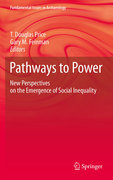
Pathways to power: new perspectives on the emergence of social inequality
Price, T. Douglas
Feinman, Gary M.
There are few questions more central to understanding the prehistory of our species than those regarding the institutionalization of social inequality. Social inequality is manifested in unequal access to goods, information, decision-making, and power. This structure is essential to higher orders of social organization and basic to the operation of more complex societies. An understanding of the transformation from relatively egalitarian societies to a hierarchical organization and socioeconomic stratification is fundamental to our knowledge about the human condition. In a follow-up to their 1995 book Foundations ofSocial Inequality, the Editors of this volume have compiled a new and comprehensive group of studies concerning these central questions. When and where does hierarchy appear in human society, and how does it operate? With numerous case studies from the Old and New World, spanning foraging societies to agricultural groups, and complex states, Pathways to Power provides key historical insights into current social and cultural questions. - Follow up to the very popular Foundations in Social Inequality, with brand new research and case studies- Authors are all well-known experts in archaeology, and particularly in the developement of social hierarchies - Case studies have implications for INDICE: Who Tilted the Playing Field.- Degrees and Kinds of Inequality.- Gimme That Old Time Religion.- Traces of Inequality at the Origin of Culture.- Decentralized Complexity.- Bitter Arrows and Generous Gifts.- Who Benefits from Complexity?- Dual-Processual Theory.
- ISBN: 978-1-4419-6299-7
- Editorial: Springer
- Encuadernacion: Cartoné
- Páginas: 298
- Fecha Publicación: 29/08/2010
- Nº Volúmenes: 1
- Idioma: Inglés
